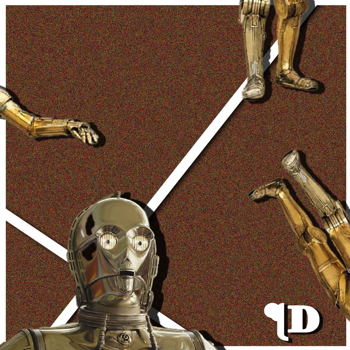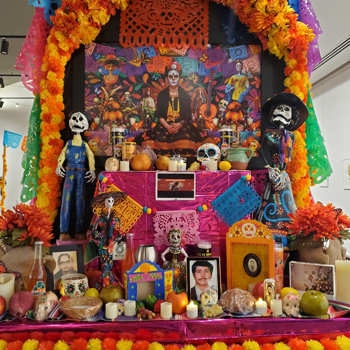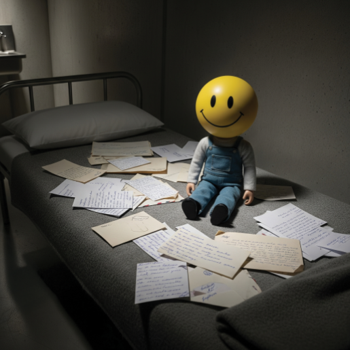Where She Went When She Was Gone
 Artwork by Heather Lim
Artwork by Heather Lim
There was a woman who came sometimes to the back door of my club. She would knock four times and if I heard her I would let her in and take her to my office. If she knocked and I didn’t hear her I thought she just went home, but I never asked her about it. In my office I would close the door behind her and sit her down and she would tell me some of the things that were going to happen in my life if I didn’t get my act together.
There were girl dancers at my club and sometimes I would pass them as I brought the woman to my office and they wouldn’t look at her. Like they were afraid or like she wasn’t the kind of person who should be in that kind of club. They never mentioned her. But once I asked a girl why they acted that way and she told me that a person like that shouldn’t be brought into anybody’s office let alone with the door open but closed was worse. I didn’t know what she meant by a person like that, but I thought I understood about the door and so the next time the woman came I brought her to my office and left the door open. She wouldn’t sit down and only stood there glassy eyed saying nothing. When I did close the door she sat down and told me some things that would happen to me.
I can remember the first time she came. I heard the knocking and opened the door just a hair because it was late and nobody came to the back door late. She stood there in her coat and hat looking like a lady in need of something like a phone to use. So I brought her in and took her to my office and I don’t remember saying anything to her until she sat down in the chair across from me. Whether I said anything or not doesn’t matter because she started telling me that if I didn’t straighten up there would be trouble and here’s what the trouble would be. From what she said and the way she said it I knew she was telling the truth.
Her name was Shelley. I didn’t hear it from her but from a man who frequented the club. He and I became acquainted one night. His name was Robert Greene he said and it was important that I knew it was Greene with an e at the end of it. He was a regular and a good spender but I wasn’t in the business of making the rounds and introducing myself. Mostly I stayed in my office and looked over the accounts.
Robert Greene came to the back one night and made it known that he had a question for me. One of the girls knocked on my door and told me that someone wanted to see the owner. I sighed and made a bit of a fuss about it but went out to meet him anyway. We shook hands and I tried not to show on my face that I couldn’t believe how slick his palm was. We had good ventilation for Christ’s sake and what would make a man sweat like that.
It had been several weeks since Shelley showed up for the first time and she had come by just two days before I met Robert Greene. He said a few words of introduction, Greene with an e, before asking if we could talk in private. I hesitated about the office. The office had become a certain kind of place for me.
I thought of taking him to the boiler room, I thought of some excuses. But there was a way of doing things and I brought him to the office. We sat down and across from me his pink face was slick with sweat. Really, I thought, and paying for all this goddamn air conditioning. My temper flared and I thought of Shelley although I didn’t know her name just then.
Robert Greene asked me if an old woman had ever shown up here looking lost and confused. A short old woman wearing a dark blue raincoat and a black hat and with a look like she didn’t know where she was. He sat very still as he spoke and he was sweating profusely.
She had never seemed short or very old to me, but when I thought about it I recalled that she was both. It felt strange to recall something that I hadn’t noticed in the first place. And the coat had been a raincoat all along and she wore it whether or not it was raining and this all meant nothing to me before Robert Greene said it. He was wearing a white shirt and there were dark grey rings of sweat around his underarms.
“There was an old woman who knocked on the back door here one night,” I said, “but she didn’t look lost. I thought she wanted to use my telephone.”
At this Robert Greene came to life and leaned forward over the desk. “She’s my mother. Her name is Shelley,” he said. I wondered would he drip sweat onto my accounts. “She has dementia,” he went on, “and lately she’s made a habit of just walking out the front door when I’m not home.” He leaned back in his chair and I felt myself relax. “When I’m home she stays put, but with work—”
His voice trailed off and I went on looking at him. He was a regular and a good spender. “I see,” I said.
“She has an at home nurse, but only on Mondays, Thursdays, and Sundays,” said Robert Greene. I’ve got a temper but never a face that pink, I thought. I didn’t know what to say to him and I knew he would just go on talking. “I can’t always be home,” he said, “and the neighbors used to see her out and walk her back to the house so it wasn’t so bad.”
Then he told me about how eventually the neighbors didn’t see her at all and he would come home to the front door wide open and he wanted to look for her of course but where would you even start. Sometimes he drove around looking for her a while but there would be work in the morning and the suburbs were like a maze. And she always came back. He would get home from work the next day, worried sick of course, and there she was. With the nurse if it was a nurse day or just sitting in her green plush chair and listening to the radio like she had never even left. He couldn’t get a word out of her about where she went when she was gone.
“It’s a terrible thing, dementia,” I put in. I didn’t believe his story, but I would let him finish it.
“Yes. It is,” he said. “Well, you’re wondering how I knew she came here.”
“Well.” He reached into his pocket, took out a small card, and placed it on the desk in front of me. On it were the suggestive outlines of two women, one on the left of the card and one on the right. Between them was the name of my club in block letters and beneath it an address and phone number. I looked down at the phone number and wondered why he didn’t call.
“I guess I brought one home and she must have gone through my pockets,” he said. “Two days ago I found it tucked under the cushion of her chair.”
“And you think she’s been coming here,” I said. I picked up the card and turned it over. On the back was a faded red lipstick mark.
Robert Greene sat very still and said, “Sure, you said as much. The old lady looking for a telephone. Shelley Greene.” He clasped his hands over his stomach and seemed to settle into himself. We’re talking about the same lady but not the same lady, I thought, and then I got angry.
“Well what are you coming to me about it for?” I tossed the card back to his side of the desk. “Lock your goddamn doors from the outside. Take her to work with you. Have her committed. What are you coming to me about it for?” I held my upturned palms out to him.
Robert Greene kept his big hands clasped on his stomach. “I just want you to call me if she ever shows up here again,” he said. “That way I can come get her. Even if I have to roll out of bed to do it, I’ll drive down here to get her.” He took out another business card and slid it towards me. Robert Greene. Insurance broker. Phone number but no office address. It embarrassed me, how calm he was. I didn’t like to get angry for nothing.
“Actually, it’s delicate,” he said. “This place and my mother. If you could—” I knew where this was going. Shelley had never mentioned a son. She never said anything about anyone besides me. But if she did have one, and if he was sitting here across from me, I wasn’t gonna buy his shit heap story and then lie myself sick to his mother about who he was and how he spent his money. That was some favor to ask, and I let him know it. I told him what I thought, what I’d been thinking. About his story, and the dementia, and his excuses, and him.
Robert Greene listened to the point of boiling over. “Why would anybody lie about that?” he shouted. He struck his chest with both hands. “Why would I lie?” Then he was on his feet pacing the office. That was fine. It was my turn to clasp my hands and settle into myself.
“With my mother gone and missing as we speak. Diagnosed, my mother. And you give me—” He stopped and slumped back into the chair, breathing hard. I was thinking that he wanted to keep her from me. That he knew what she was. I glanced at the clock on the wall behind him. It was late. The club would soon close and we would both go home and that would be fine.
He looked down at the carpet and shook his head. I said something about closing, gestured at the clock. He didn’t notice. I thought he might cry and I had never seen a grown man cry anywhere but at a funeral. I got up and went over to him. I put a hand on his shoulder. I told him I couldn’t promise anything, that it would be easy to promise if he told me the truth, but for now it was time to go. I had his card. I would call if I needed him. Robert Greene said nothing. He just shot up and left the office, throwing open the door hard. I followed him out to make sure he didn’t cause any trouble but he was gone. Two of the girls walked by and looked at me sidelong. They walked faster and faster until they turned a corner. I leaned against the wall and waited.
It was not long until I heard the knocking. She had on her hat and raincoat. I said hello. I said she had just missed her son. We got into a bit of a row, actually. Over you, if you can believe it. Let’s go to my office.
I called her Shelley like it was our little joke. She didn’t seem to hear. I brought her in and closed the door and cleared some of the clutter from my desk. She sat down in the chair, hat in hand. I sat down across from her. But she was looking for someone else when she looked at me. “Bobby?” she said. Her lips quivered. Her eyes shot around the room. “Bobby?”





